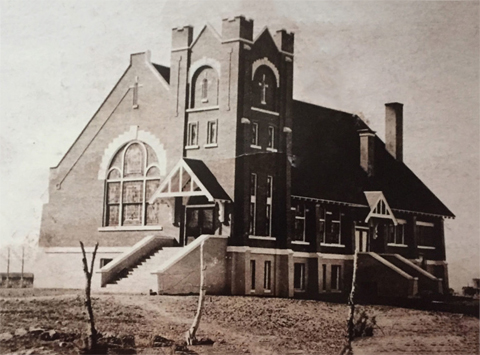Levi Savage Waldron was born at Kanesville, now called Council Bluffs, Iowa, on July 7, 1850, the son of Benjamin and Emeline Savage Waldron.
When he was one year and two days old he arrived in Salt Lake City, Utah with his parents. They had crossed the plains with one of the companies of Mormon pioneers. Two years later the family moved to Centerville, Utah, where they bought a home and built a shoe shop.
In 1854 the Waldron family moved to Malad Valley and took up a claim. It was at Oregon Springs, close to East Portage. They built a house of sod, corrals of rocks and plowed their land. His father returned to Centerville and worked at his trade, making the money for the pioneering of their new home. Levi’s half-brother, Gillispie, stayed at Malad and helped Emeline with the farm work. When they came back to Centerville they asked how things were and were told by little Levi that his “tother” mother had been put into a big box and buried in a big hole. He wondered why they bowed their heads and wept. (Aunt Sally was his father’s other wife, with whom he had been left.) When the family returned to the homestead they had poor crops and many times they had only greens made of thistles and weeds to eat.
The Waldron family was warned of Indian trouble so they started for Utah and camped by the Weber River for a few months. The following summer they moved back to Centerville, then to Willard where they lived until 1869 when they came to Malad in the spring of the year and to Samaria about October.
In 1873 Davinah Elizabeth Roderick came to Samaria. When Levi first saw her, he said, “That’s the girl I am going to marry,” Sure enough, on January 11, 1875, when she was fifteen, they were married in the Salt Lake Endowment House. John Taylor performed the ceremony. They lived in Samaria in a two-room house until their log house could be moved from Samaria to Gwenford. The roof leaked so badly that they had to put pans on the beds to keep them from getting wet.
Thirteen children were born to this union, ten sons and three daughters: Hannah, Levi Glispy, Emeline, Mary Ann, David, Benjamin, William, Charles, Walter, Thomas, Nathaniel, Ernest, and Lewis
Levi had little schooling, but he had a bright mind. He hauled wood by ox team. Sometimes he would do a day’s work with his oxen and then put 75 pins in the fence to complete the day’s work. He was never idle. He worked hard and helped his children get farms of their own. He invented a number of things after he moved to Gwenford. He made a track of two by fours and a barrel to be sent down the hill to get water. He fixed a brick to stop the barrel when it reached the bottom, then he hooked a horse to the barrel and brought it to the top of the hill, thus bringing water to the house.
In 1895 he invented a water wheel that he used to furnish power for electricity in his home. It also furnished power to run five grindstones at once so that more than one boy could sharpen their axes or their scythes at the same time. It furnished power to chop grain and to saw wood for the stoves in his home.
Levi bought a grain binder, but it wasted so much grain that he fixed a canvas where the grain was coming out, thus saving the grain. The agent came and saw how he had fixed the binder and the following year the new binders came out with canvases on them in the same way Levi had fixed his. He bought a well machine and dug most all the wells in Samaria and surrounding communities.
Father built a fencer, and as it was pulled along, it would stretch the wire so it could be stapled to the fence posts. The old wire could also be wound up on the spools. He made a wire tightener in his shop that saved a lot of time when he fenced. He also fixed an outfit to pull old staples out of the fence. Another thing which Levi made was a measuring chain out of heavy galvanized clothes line in foot lengths, two rods long, to measure land and his sons still use it as of 1968. It is especially useful now that the government wants the farmers to measure the land they plant each year exactly right.
He owned the first blacksmith shop in the valley and was an outstanding blacksmith. He also did a lot of carpenter work, always making things that made life easier around the house.
He was a very generous and hospitable person. Anyone was welcome in his home. Settlers from out west often stopped and spent the night with them. He would feed their families and horses and never accepted any pay. No one was turned away hungry.
Father kept a diary for fifty years. He lived to celebrate his sixty-first wedding anniversary though he was bedfast. He was sick fourteen months and died on March 9, 1936, at his home in Gwenford, Idaho, at the age of 86. Funeral services and burial were at Samaria. It was one of the largest attended funerals ever held there.
– The Waldron Family
